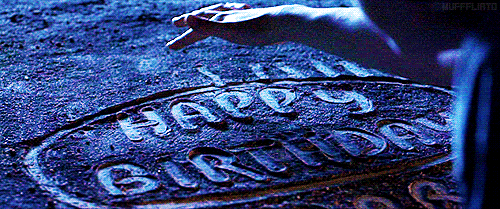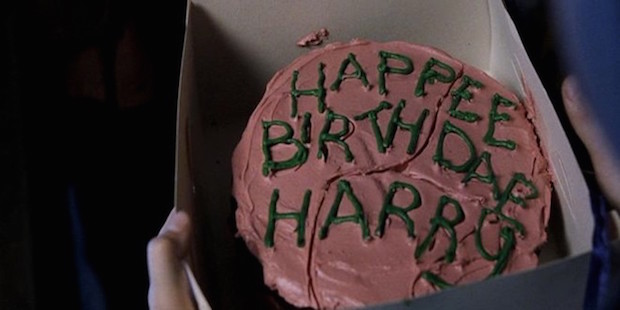Bon anniversaire, Harry!
It seems like it was a lifetime ago that I was reading the first Harry Potter book to my young son in the late 90s, he is now at University but still wants to watch the films when he is back home for Christmas!
Even though he is English, my son grew up in France from the age of 4 to 14 so education, leisure and reading was mainly in French of course; so he first read the Harry Potter books in French not English! Although not strictly linked to looking to buy a house in France we tend to find that property hunters who are looking to move to France, sometime in the future, can find some of the more obscure French terms help them impress and fit in with their neighbours.
So let's look at some of the names, places and events in the books and learn a little French along the way.

Let's look at some Harry Potter Terms in French
Bon anniversaire, Harry Potter !
On July 31st, the boy who lived turns 35. Since the first book was published in the summer of 1997, the 7 book series of fantasy and adventure novels by J.K. Rowling has become amazingly successful. Let’s look at some numbers:
The books have sold over 450 million copies worldwide, which makes it the highest-selling book series ever.
The books have been translated into 73 languages, which puts it in the top 10 list of the most-translated books in history. That’s a pretty big feat considering literary translation est extrêmement difficile (is extremely hard)!
'The French' are obsessed with the series as much as any other country.
There’s so much to say about the story, but the basic plot line revolves around a boy named Harry and his two friends Ronald Weasley and Hermione Granger, all students at Hogwards School of Witchcraft and Wizardry, who try to stop Lord Voldemort from conquering the wizard world. That’s just a gross oversimplification of the story, but if you’re interested, you can read all 4,224 pages in the series to discover everything.
So are you curious how they would translate J.K. Rowling’s invented words like Muggle? C’est un Moldu en français. Hogwarts? Ever imagine what a hog’s warts look like? The idea was translated into French pretty well – it doesn’t have the exact image, but the reader is still presented with an unpleasant idea: Poudlard (roughly meaning pig lice).

To celebrate Harry’s big birthday, we are going to share some Harry Potter terms in French!
Ready? Allons-y (let’s go) !
Les Titres (The Titles)
Gotta have these. They’re the base, after all…
Harry Potter à l’école des sorciers
Harry Potter and the Philosopher’s Stone
Harry Potter et la Chambre des secrets
Harry Potter and the Chamber of Secrets
Harry Potter et le Prisonnier d’Azkaban
Harry Potter and the Prisoner of Azkaban
Harry Potter et la Coupe de feu
Harry Potter and the Goblet of Fire
Harry Potter et l’Ordre du phénix
Harry Potter and the Order of the Phoenix
Harry Potter et le Prince de sang-mêlé
Harry Potter and the Half-Blood Prince
Harry Potter et les Reliques de la Mort
Harry Potter and the Deathly Hallows
*****
Les Maisons (The Houses)
At Poudlard, you’re sorted into one of four different houses through the Le Choixpeau magique (the Sorting Hat). Below I’ve listed the 4 houses and a few of their traits. Through a few online tests, it would appear I’m a Ravenclaw. Any other Ravenclaw readers out there?
Gryffondor (Gryffindor) – courage, force d’esprit (strength of will), hardiesse (boldness), tolérence
Poufsouffle (Hufflepuff) – constance (dependability), patience, layauté (loyalty)
Serdaigle (Ravenclaw) [represent!]- créativité (creativity), érudition (learning), sagesse (wiseness)
Serpentard (Slytherin)– ambition, détermination, finesse, ingéniosité (ingenuity)
*****
Les Personnages (Characters)
Many character names have stayed the same. Some last names have been changed, though (looking at you, Neville Longbottom… er, Neville Londubat). For names that have stayed the same, I haven’t included them. Below you’ll find names that have been translated differently in the French text. I’m almost positive I’ve missed some. So many characters…
Anyway, let’s take a look!
Hogwards Staff
Argus Rusard – Argus Filch
Professeur Chourave – Professor Sprout
Professeur Gobe-Planche – Professor Grubbly-Plank
Maugrey Fol-Oeil – Mad-Eye Moody
Severus Rogue – Severus Snape
Hogwards Students
Neville Londubat – Neville Longbottom
Pénélope Deauclaire – Penelope Clearwater
You-Know-Who - In the French translation, Voldemort goes by both Voldemort and Lord Voldemort.
Here are the other names…
Tom Elvis Jedusor – Tom Marvolo Riddle. Just as the English name is an anagram for “I am Voldemort,” the same holds true for the French equivalent: Je suis Voldemort can be formed from the letters in Tom Elvis Jedeusor. This is a fantastic translation, too: jedeusor sounds like jeu de sort, meaning a riddle of fate.
Celui-Dont-On-Ne-Doit-Pas-Prononcer-Le-Nom – He-Who-Must-Not-Be-Named
Tu-Sais-Qui – You-Know-Who
le Seigneur des Ténèbres – The Dark Lord
Ghosts
Mimi Geignarde – Moaning Myrtle
Nick Quasi-Sans-Tête – Nearly Headless Nick
Animals
Buck – Buckbeak
Croûtard – Scabbers (un croûte is a scab)
Fang – Crockdur
Miss Teigne – Mrs. Norris
Pattenrond – Crookshanks (patte means paw and en rond can mean crooked)
Touffu – Fluffy (touffu means bushy)
*****
Les Lieux (et quelques objects)
(Places and a few objects)
Sometimes when I don’t know or forget a word in French, I’ll describe what it is to get my point across. How do you get to that street where you can buy all your wizard school needs…? No need to describe it when I can give you the name!
Before making your way into the halls of Poudlard (Hogwarts), there are a few things you have to do first. Maybe you need to pick up un hibou (an owl) or une baguette magique (yes, it could technically mean magic bread, but here it’s a magic wand)? No problem! Just head on down to Chemin de Traverse (Diagon Alley). You can get there by accessing the secret entrance in the back of Le Chaudron Baveur (The Leakly Culdron). Need to drop something off for safe keeping? You could go on down to Banque de Gringotts (Gringotts Wizarding Bank) and use a safe.
When la rentrée (beginning of the school year) arrives, you’ll need to catch the Poudlard Express (Hogwarts Express) on la voie 9 ¾ [that fraction is pronounced as trois-quarts] (Platform 9 ¾). If you get hungry on the train, you can always buy some Chocogrenouilles (Chocolate Frogs).
Once you’re at Poudlard, you can keep up with current events by reading La Gazette du sorcier (The Daily Prophet).
A little advice, though: do not steal your father’s car for any reason, or you may get une beuglante (howler) from your mother! Also, it’s not worth going to search for le Miroir du Riséd (the Mirror of Erised) because Dumbledore will just move it.
Are you a third-year student at Poudlard? Looking for weekend trip? Your class has been granted permission to visit Pré-au-lard (Hogsmeade)! There you can shop at Zonko (Zonko’s Joke Shop) and purchase une tasse à thé mordeuse (nose-biting teacup) or some savon sauteurs (frog spawn soap).
Are you unusual or scary? Maybe you need some material for your dark arts projects? You can buy all that on Allée des Embrumes (Knockturn Alley).
****
Les Horcruxes
Destroy these and you destroy Celui-Dont-On-Ne-Doit-Pas-Prononcer-Le-Nom!
Journal intime de Jedusor
Tom Riddle’s Diary
Bague des Gaunt
Marvolo Gaunt’s Ring
Médaillon de Salazar Serpentard
Salazar Slytherin’s Locket
Coupe de Helga Poufsouffle
Helga Hufflepugg’s Cup
Diadème de Rowena Serdaigle
Rowena Ravenclaw’s Diade
Harry
Professeur Quirinus Quirrell
Nagini
****
Le Quidditch
Quidditch is a game with 7 members per team. The players fly around on broom sticks while trying to score points against the other team etc etc, you know how it goes. Here are the terms in French:
un batteur – player
un poursuiveur – chaser
le gardien – the keeper
un attrapeur – seeker
les sognards – bludgers
le souafle – quaffle
le vif d’or – godlen snitch
Well, happy birthday, Harry! Thanks for the memories.

Blog submitted by: David at The French Property Network - Cle France.
This blog was originally posted on The French Language Blog pages.